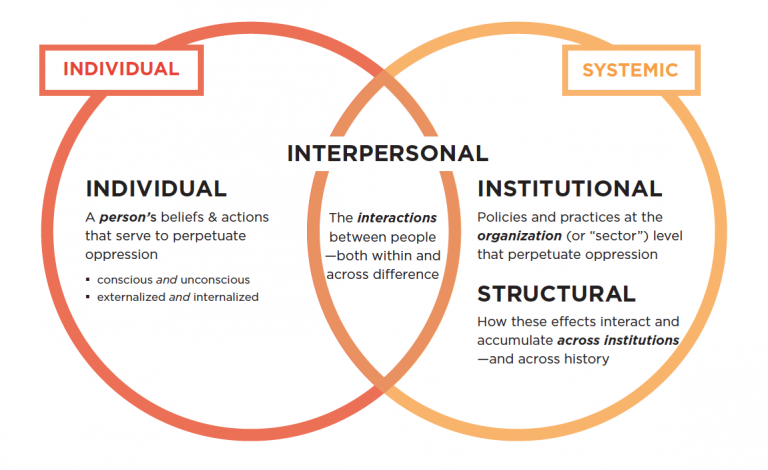Luna Malbroux's The Four I's of Oppression and Learning for Justice's Intersectionality:
Luna Malbroux argues that there are four kinds of oppression, and these forms of oppression vary for everyone due to the privilege they were born with, which relates to intersectionality. Malbroux classifies the four forms of oppression as ideological, interpersonal, institutional, and internalized. All four of these oppressions relate to people's beliefs and feelings towards others who are different from them. She then provides ways for people to solve these forms of oppression or beliefs that they have internalized about others or themselves.
The first form of oppression is ideological, which is rooted in our value systems that allow people to dehumanize, take advantage of, or harm other people due to them being different than them. A way to solve this form of oppression is to start the long process of social, political, economic, and cultural change. This would require everyone to work together; no one person or group can solve this issue by themselves. Another form of oppression is internalized. Internalized oppression addresses the way people absorb belief systems that lead to feelings of false supremacy and deficiency within themselves and with others. To challenge this form of oppression, people have to be taught or teach themselves about "liberation learning". This means that people have to learn about injustices and see if they hold an opinion towards a group of people due to past events. The third form of oppression is interpersonal. Interpersonal is a way internalized oppression is expressed between people either by accident or on purpose. People can say something that seems like a compliment, but it is actually an insult because they are surprised by a person being good at something due to who they are. A way to challenge this oppression is taking accountability and changing your way of thinking. The final one is institutional oppression, which is the way oppression is perpetuated socially through policies, laws, and social practices. Ways to solve this involve transparent, dedicated, accountable, diversity, equity, and inclusion work towards change. These forms of oppression will all take a while to eliminate from our society. To remove them, every person, no matter what they look like or what power or privilege they have, needs to unite and listen and respect each other.



Hi Leo, I am glad you have included Malbroux's example of interpersonal oppression. I think that it is important for people to know and understand that microaggressions can be expressed in the form of backhanded compliments. I like that you have listed this beside ways to challenge this form of oppression form the TREC paper.
ReplyDeleteHi Leo! I like the point you made about everyone experiencing oppression differently. There are so many ways that people experience oppression, and not everyone is going to experience it the same way. Like you have said, there are some people who are privileged enough to never have to face it, in particular, straight, white, rich men. It's important to note that oppression happens in different ways whether it's institutional, interpersonal, internalized, or ideological. As a society it's important to come together and find solutions to social injustices, even those who aren't directly affected by oppression need to join in because they hold the power to make the change.
ReplyDeleteHi Leo, I completely agree wit your reflection I think every person's struggle is unique based upon the makeup of their identity whether it be gender, race, culture, disability, etc. and it's important to address all parts of that when discussing these issues and disparities. I also enjoyed your additional research thank you for helping expand my knowledge of this topic!
ReplyDelete